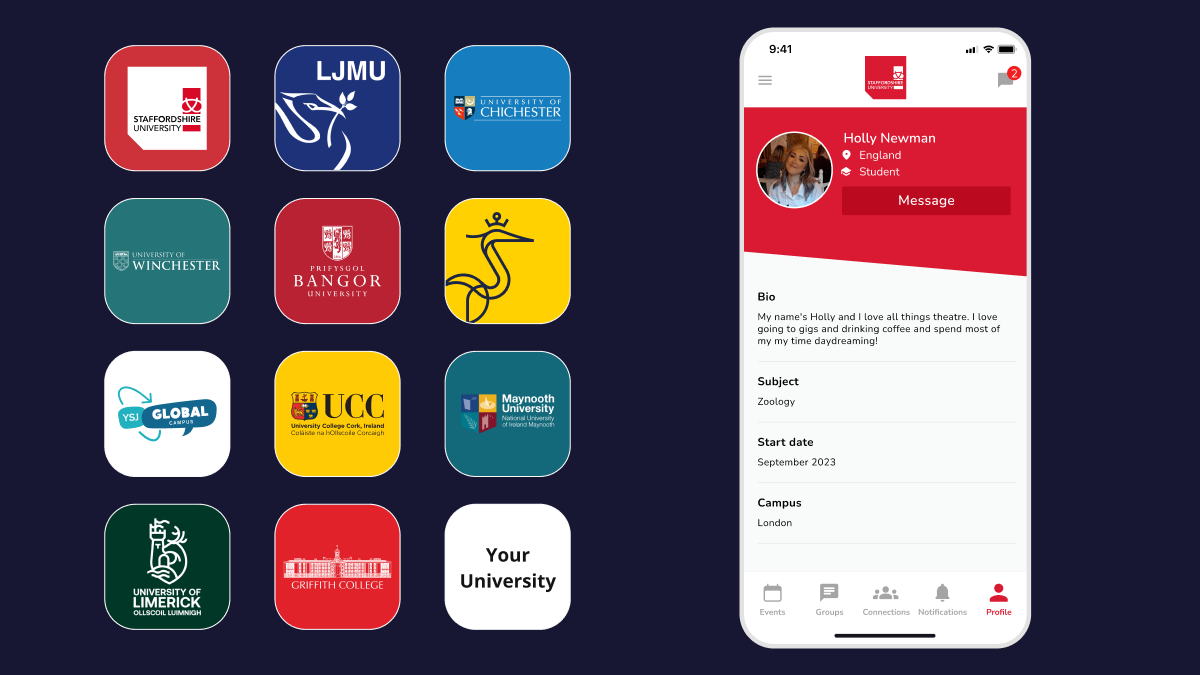University-Owned Student Communities - A Growing Trend?
This year we’ve seen more UK & Irish universities choose to invest in their own ‘university owned’ space to build their student and wider stakeholder communities. Moving away from third party community platforms with disassociated brands, a white-labelled community approach such as what we provide at CampusConnect, is a fully customisable, university branded community platform that is tailored to match our partners unique identity and strategic requirements.
Here we outline why more universities are opting for this approach:
Branding and Identity: Choosing for a white-labeled community app allows our university partners to maintain its brand identity and create a consistent experience for students. The app can be customized with the university's logo, colors, and visual elements, reinforcing the institution's brand presence and fostering a sense of belonging among students. The app appears as if it's developed and owned by your organization, creating a cohesive brand experience for your users. On the other hand, a generic offering typically comes with predefined branding and may display the provider's logo and visual elements.
Personalization and Customization: With CampusConnect, the university can tailor the app's features and functionalities to align with its specific community related goals. Customisation options enable each university partner to create a unique and engaging platform that addresses the specific needs of its student population. This level of personalisation enhances student engagement - E.g. CampusConnect communities regularly hit over 150,000 messages per cycle - and satisfaction.
Ownership and Control: By utlising their own community service, the university retains ownership and control over the platform and its data. This control allows teams to integrate the app with other systems, manage user data according to their privacy policies, and ensure compliance with relevant regulations. It also provides the flexibility to update and adapt the app proactively, as per each university partners evolving requirements.
Scalability: CampusConnect provides significantly more flexibility when scaling because each partners owns their own domain and unique stack. As the community grows, the app allows partners to adapt and scale the platform to accommodate increasing user demands, while a generic offering is likely to have more limitations.
Seamless Integration: CampusConnect app can be seamlessly integrated into the existing digital infrastructure of the university. This integration enables the app to leverage existing systems, such as the university's authentication system, student information system, or CRM, for streamlined user experiences. Integrating with familiar tools and platforms can simplify the onboarding process for students and encourage adoption.
Support and Maintenance: CampusConnect comes with a dedicated support and maintenance service. We offer personalised assistance, training, and troubleshooting for the university, ensuring smooth operation of the platform. This level of support can be particularly beneficial for universities that may require additional guidance during the implementation and ongoing management of the community app.
Long-term Strategy: A white-labeled community app such as CampusConnect allows the university to build a long-term strategy for community engagement and development. By customising the app according to their specific needs, our university partners can foster a strong sense of community, facilitate effective communication, promote student involvement in activities and events, and provide valuable resources and services.

